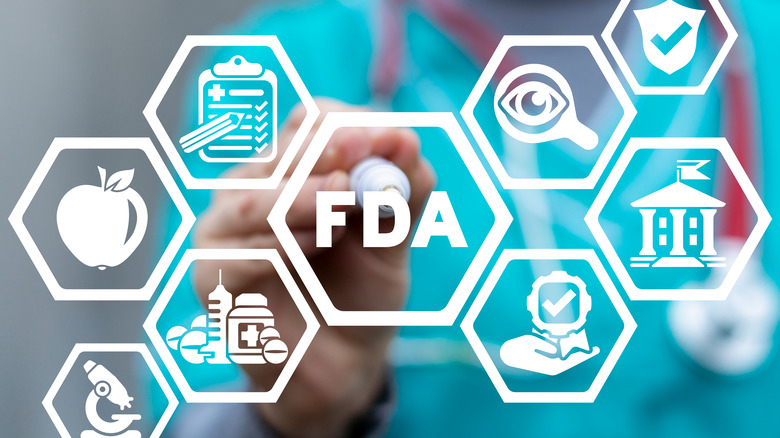Why Is FDA Approval Of This New ALS Drug So Controversial?
Amyotrophic lateral sclerosis, also known as ALS or Lou Gehrig's disease, is a fatal neurodegenerative disease with limited medication treatments, according to NBC News. A new drug has just been approved by the Food and Drug Administration (FDA) and could increase the life expectancy of those diagnosed with ALS by 10 months. But is it safe?
ALS is a progressive illness that causes the motor nerve cells and spinal cord to deteriorate, affecting muscle strength (via Johns Hopkins Medicine). It can cause many different symptoms, the most common including muscle cramping and twitching, weakness and fatigue, loss of control of the arms and hands, falling down, slurred speech, and uncontrollable bouts of laughing or crying. As ALS gets progressively worse, it can cause breathing difficulties, shortness of breath, and even paralysis. While there's a clear genetic link for about five percent of cases, the majority of cases of ALS have no apparent cause, making it a highly mysterious disease. There's no cure for ALS, though patient survival is increasing with more research and improvements in medical management. About half of all patients will live at least three years after being diagnosed, 20% will live about five years more, and up to 10% will live for over 10 years.
Patients are desperate for ALS treatments
There are only a handful of medications approved to treat ALS, and a new one, which will be called Relyvrio, just joined the list after being approved by the FDA (via Amylyx). But because an FDA advisory committee originally voted against approving it in March, many experts are concerned about the current reversal of that decision (per NBC News). Relyvrio's creator, Amylyx Pharmaceuticals of Massachusetts, only ran one phase 2 clinical trial of 137 participants. The FDA initially declined its approval, and then after Amylyx submitted new analyses of the data just six months later, a second advisory committee recommended the drug for approval. A phase 3 trial is currently being conducted.
The drug, which will cost patients an enormous $158,000 per year, was shown to slow the progression of ALS in its single clinical trial, which is meaningful for those who suffer from the rapidly-fatal disease and who are desperate for treatments. While advocacy groups are applauding Relyvrio's approval, some members of the advisory committee and other FDA scientists are still raising concerns.
Typically, FDA approval requires evidence from two well-controlled clinical trials, in order to eliminate any possibility that the first trial was the result of coincidence or bias (via FDA). In some cases, one convincing trial is enough, especially for rare diseases. But Amylyx's trial didn't meet FDA standards, leading some experts to worry about whether the evidence is strong enough (via NBC News).


